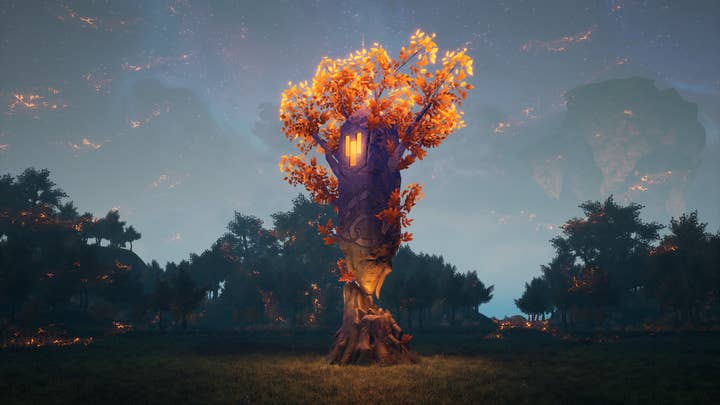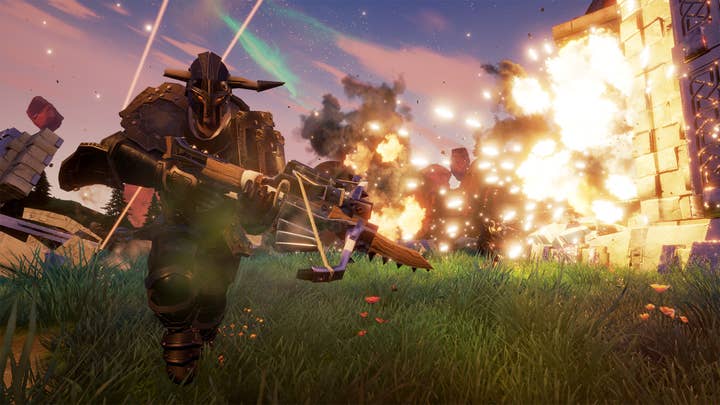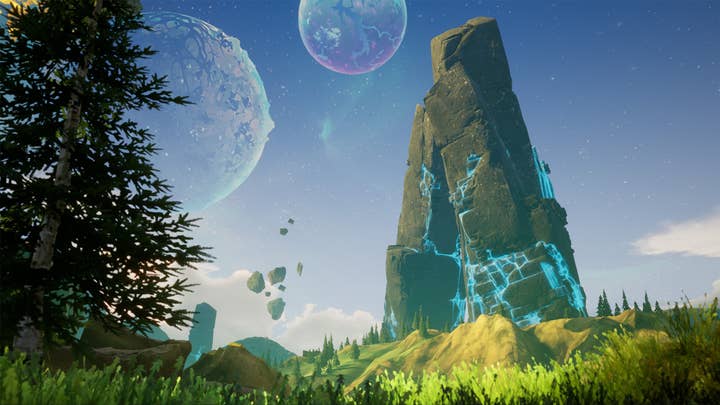Frostkeep Studios is serious about making "the game that players want" with Rend
CEO Jeremy Wood on bringing MMO design, Blizzard philosophy, and community focus to the survival genre
Almost a year and a half ago, when GamesIndustry.biz last spoke with Frostkeep Studios, the team's modest goal was simply to get its team-based survival game, Rend, into Early Access. A few days ago the team accomplished that goal, emerging from alpha with an interesting, MMO-inspired take on the survival genre and a forthright approach to community feedback that will continue to shape the game in the coming months and years.
Rend presents a unique twist on survival by adding elements from MMOs and other genres to a Norse-inspired universe. Players are split into three factions competing in 20 v 20 v 20 matches for the honor of "ascending" to Valhalla. But while you might expect a match to last 15 to 20 minutes, or an hour, or even a week, Rend's matches take place over multiple weeks as factions vie for control over resources, fight off AI enemies and one another, and participate in scheduled, weekly events to increase their own standing.
"Anyone can hop into a game and immediately become part of an existing community that really feels like an MMO"
The world of Rend is diverse, with multiple biomes, creatures and challenges scattered around the great tree at its center. This visual and geographical scope make it look at a glance more like an MMO than a survival game, and there's a reason for that. The studio's co-founders Solomon Lee, Mat Milizia and Jeremy Wood all met while working at Blizzard on World of Warcraft. When I spoke to Wood, he said that while the company does borrow heavily from MMOs, the team's time at the company left more of a philosophical impression than a design inspiration.
"Blizzard's philosophy was that it doesn't matter if you invent something brand new," Wood said. "What matters is that you take aspects from different places, games and genres and put them together in a way where you're not re-inventing the wheel, but you're making a really interesting wheel because you borrowed from eight other wheels. We took that philosophy and looked at survival as the core genre, then borrowed heavily from mostly MMOs, but other RPGs as well. We put all these existing ideas together into a new package that really stands out."
In borrowing from MMOs, Wood feels Rend can address some of what he feels are the core issues with the survival genre. To start, he hopes that the beauty of Rend's world will serve as an interesting contrast to the dark grittiness of typical survival games. And there's a functional aspect as well.

"The points that knock people out of [survival] games, like getting your base raided at 4 o'clock in the morning or needing a preset group of 15 friends in order to succeed, we've solved those," he said. "Anyone can hop into a game and immediately become part of an existing community that really feels like an MMO, even though you didn't know any of these people beforehand. You really get a completely different community feel, that is more MMO-feeling than survival-feeling, when you're playing our game."
Wood said that this "MMO-feeling" from the community will ideally prompt players to engage with one another in positive ways, facilitating teamwork and forming interesting, communicative groups over time. For example, players who have just started playing can contribute to the faction just as valuably as players who have been in the game for weeks, months or years. But experienced players are valuable, he said, because they can provide guidance for newcomers just showing up. "As a faction you win or lose together," he added, "and that includes making sure all your members are as fully functional as they can be."
"We're not charging subscriptions. There's no monetization. There's no cash shop. No microtransactions. You buy the game, and you play as long as you want"
That's a nice sentiment on its own, but given how many online games have issues with toxic communities I was curious as to how Rend would deal with inevitable bad actors. The game has normal community support tools, Wood replied, but on top of that there are in-game systems to discourage players from being rude or even simply unhelpful. A player-driven reputation system, for instance, gives the community some ability to police itself.
"If you have someone who is actively sabotaging a faction, killing teammates and things like that, he'll lose enough reputation where he can't even walk through doors or chat in the game's faction chat," he said. "You'll be able to go through your base's shield, but you won't be able to open doors. If you get a low enough reputation, you're basically an outcast."
Throughout our conversation, Wood continuously turned his focus to the game's community, both as it is now and what it might grow to be. Wood and the Rend team want the community to feel that they are being treated fairly throughout the process, that their voices are being heard, and that the game they get is the game they want and paid for from the start. I was initially told the team had an "old-school approach to monetization," and when I asked what that meant Wood's answer was humorously blunt.
"You pay us $30 and you get the game," he said. "We're not charging subscriptions. There's no monetization. There's no cash shop. No microtransactions. You buy the game, and you play as long as you want. You don't see a lot of that anymore strangely, but that's what we feel is the most fair way of delivering the game to our players."

That doesn't mean the team won't continue work on the game after its full launch, Wood added later, saying that paid expansions would eventually be on the table if the game was successful. "But we're not going to use any of our development time making new shiny clothes and fancy hairstyles that we're going to charge people a buck for," he said. "We don't want to divide our development time between making money and making the game. We want our time to go toward making the game."
Though Rend seems like the kind of game that would quake even a little against the popularity of something like Fortnite, Wood doesn't see the point in endlessly chasing the next trend. The lessons Rend took from Fortnite as the game exploded were purely what the team saw as useful in making their own idea more fun. And that, in turn, would give the community more ways to get involved.
"If battle royale comes out of Rend, I wouldn't be surprised"
"We took some lessons from Fortnite in terms of how quick and easy it is to just build things," he said. "It felt so snappy and fun that we actually modified our building system based on that from a feel perspective. We don't really have a whole lot of battle royale mechanics in our game, but we are going to be releasing a modkit sometime down the road that will allow people to make drastic changes to the game itself.
"So if someone wanted to make a Rend Battle Royale, it wouldn't be hard for a mod maker to do that. That's how battle royale was born, right? Modding survival games is a huge part of the draw for the community. If battle royale comes out of Rend, I wouldn't be surprised."
Current and future players, modders, who else should be involved? The streaming community, of course. 20 v 20 v 20 matches already sounds like the kind of crazy, anything-can-happen adventure that appeals to streaming audiences currently infatuated with battle royale, but there's more to it than that. Once per week, Rend will have a scheduled period where the shields around each faction's base disappear, AI enemies flood the field, and players can enter and attack rival faction's fortresses. It's made for streaming.

"Having it scheduled means the streamers can guarantee that action for their audience," Wood said. "That gives us a big advantage over a lot of survival games where the players don't know when the action is going to happen. We've gotten a lot of feedback from content creators that this format is very helpful for them in delivering something to their audience."
Rend's "really interesting wheel" of different styles sounds like a bit of a gamble, but Wood is confident that the team is listening to its community to ensure the game is something that will appeal to an audience. He said the team regularly pops into Discord channels and listens to feedback from a community that is increasingly eager to respond.
"We're making a game that our players like and our players want, and if that doesn't line up with what we want, then maybe we're the ones that are wrong"
"Players happily give us their unfiltered feedback," he said. "They know we're not going to get in an argument with them and say, 'No, that's not the game we're making.' We're happy to take their feedback and piece it together to make the game that players want. We try to remove ego from the equation completely on our side. We're not going to make something because it's something we like, or we want. Those words don't mean anything to us.
"We're making a game that our players like and our players want, and if that doesn't line up with what we want, then maybe we're the ones that are wrong. That's fine. We're not making it for ourselves, we're making it for them. And we're starting to hear a lot of buy-in to that philosophy. We're starting to hear, 'Oh, these developers are actually different.' Which is good. We've been beating that drum for a couple of years now.
"We don't have a guy with a vision that is driving the entire game, which is your usual game development situation. We had very loose ideas of what we wanted to do, we did that, and then we brought people into the process and it evolved from there. I can't tell you what we have planned for the next six months, because it's going to change tomorrow.
"Because we aren't stuck behind your traditional game development philosophies, we can pivot incredibly fast, we can get updates out very fast, and it really is getting a lot of traction in our community. They see that they have real control over how this game develops and they're very excited about it."
Wood was careful to specify later on that this doesn't mean the team just has nothing planned at all for the next six months. The team has a "very aggressive content schedule" on the horizon, and is hoping to have major content patches every two to three weeks for the foreseeable future. He sees this Early Access period as a way to connect with players and ensure the overarching direction of Rend is one that the community signs off on. Once it gets to full release, he said, the game will have "all the bells and whistles you'd expect from any fully launched game" and will not involve giant directional shifts on a monthly basis. But the community will remain key both in small tweaks and in providing feedback toward larger, future expansion packs.
"We want to be in Early Access while the game is very, very fungible," Wood said. "We see this as how Early Access was meant to be when Valve announced it however many years ago. It's a game that has a lot of different directions it can go, and Early Access to us is a way to ensure our community is in the driver's seat and can determine which direction they want it to go."
